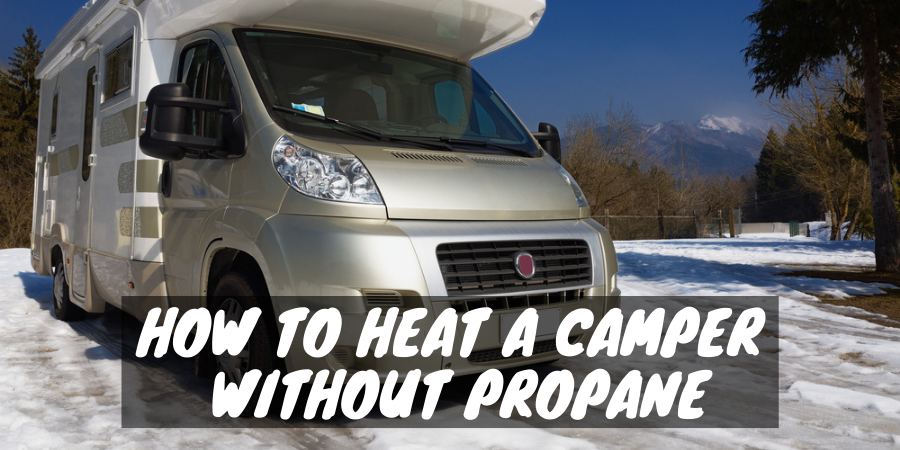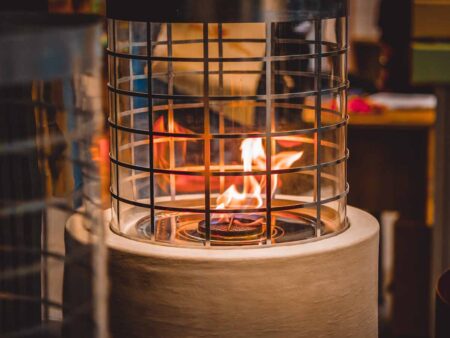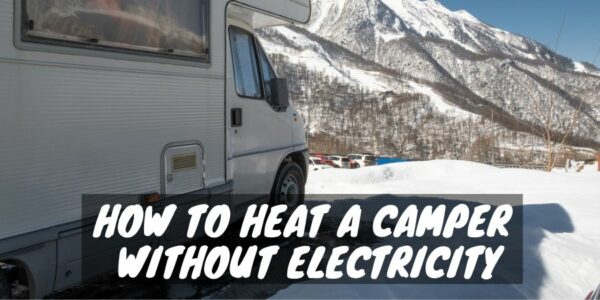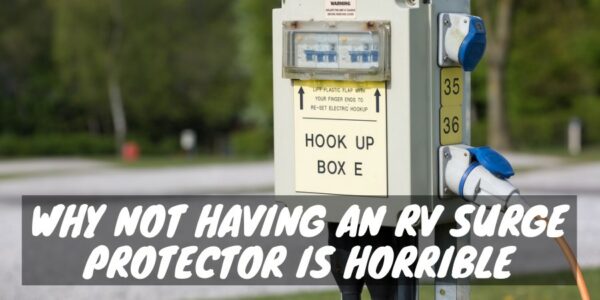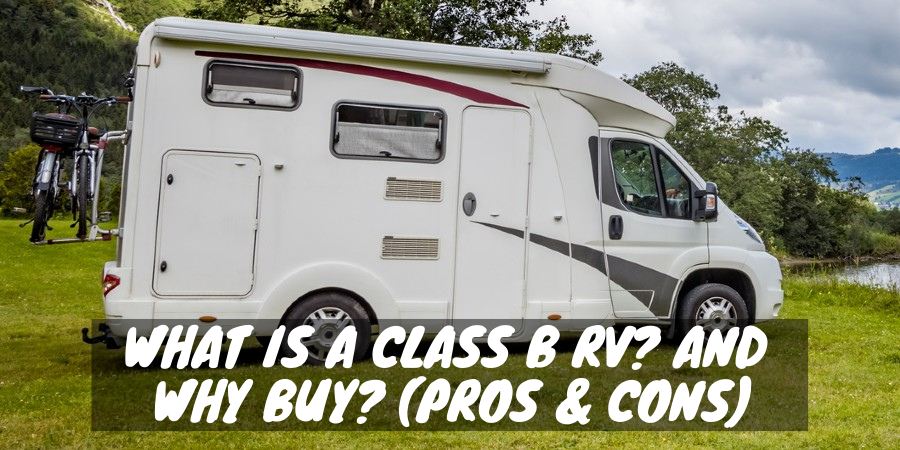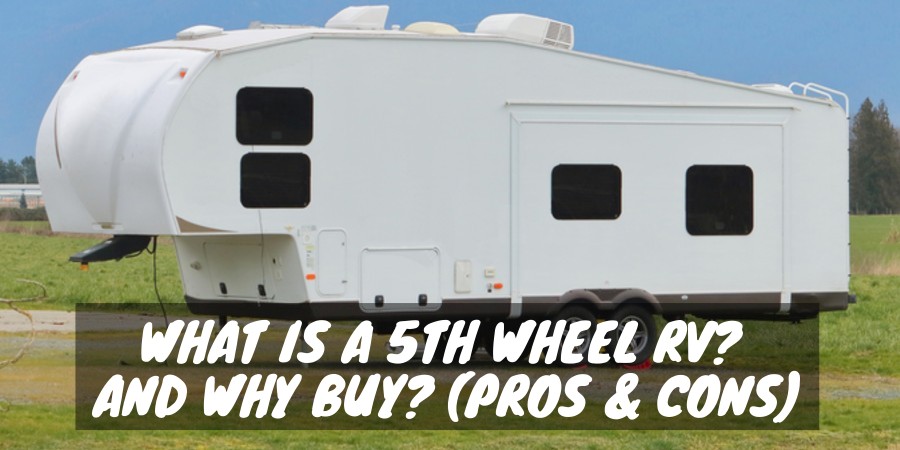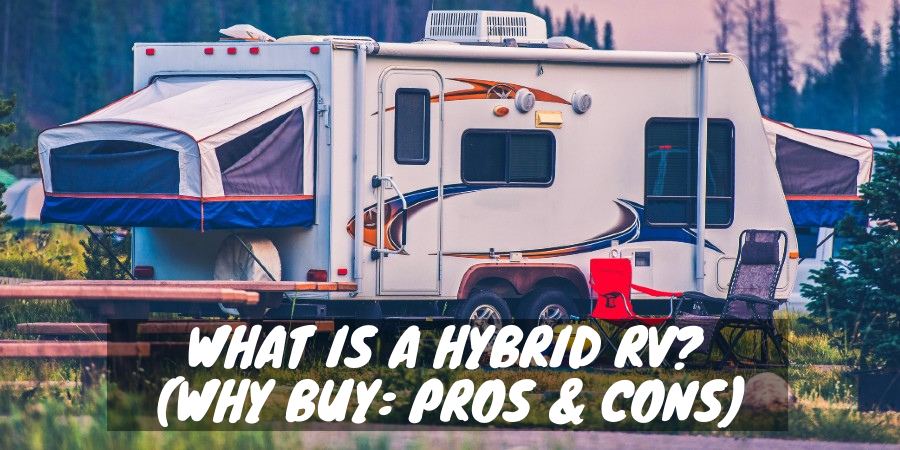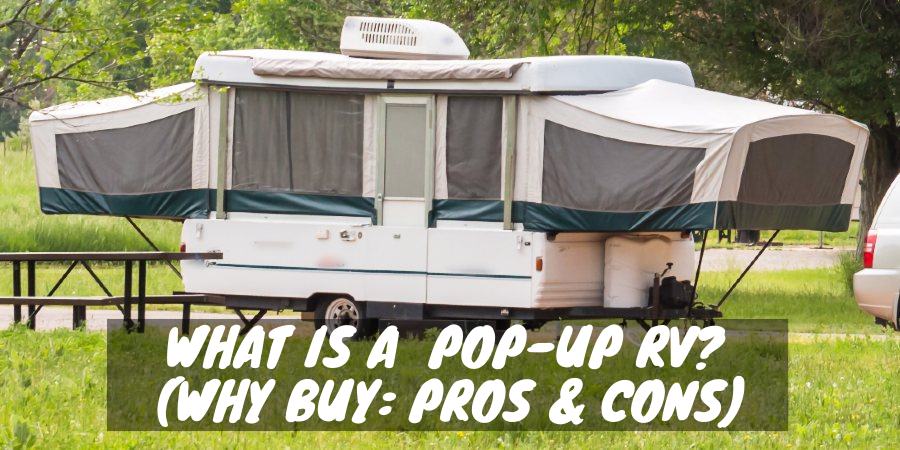Do you love cool-weather camping but want an alternative to propane heating?
Propane is expensive when running an RV furnace all day, and not all RVs use propane or have a heating system, so are there other options to warm up a recreational vehicle? The answer is yes!
To help you understand which heating methods are safe and practical to use in a camper’s confined spaces, I put heating methods for both off-grid and shore power camping situations in this guide.
From space heaters to wood stoves, I detail how to heat a camper without propane so that you can stay toasty at any time of year!
Why You Need to Know How to Heat a Camper Without Propane
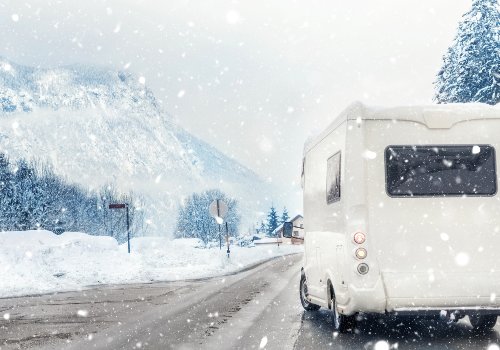
Even if your camper has an excellent propane heating system, there are plenty of reasons to have a backup plan in place.
Running Out of Propane
Whether you’re dry camping or in a standard campground, running out of propane is a real concern during cold weather.
Most RVs have one or two 20-30 gallon propane tanks on board. An average RV furnace draws about 1/3 a gallon of propane hourly when running nonstop.
You may wonder how many gallons of propane is in a 20-pound tank, and the answer is 4.5. A 30-pound propane tank holds seven gallons.
Knowing how much propane is in your tanks and how much your camper draws is crucial for timing your camping excursions when that’s the only source of heat.
Your RV furnace will alternate off and on during cold weather, which extends the length of time your propane will last, but you’ll have a hard time knowing just how long.
If your boondocking and using propane to run your fridge, stove, and water heater along with your furnace, you’re going to run down the tanks fast.
When that happens, you’ll be stuck being cold if you don’t have easy access to a propane-fill station.
For those who love to stay at campgrounds that have on-site or conveniently close propane fill centers, you’ll still have issues if your propane runs out after business hours.
During one of my workamping stints, filling propane was my job. I’ll never forget the lines of guests each morning after a cold night waiting to refill their tanks exclaiming how they’ve been “freezing all night.”
If any of these RVers had a small alternative heating source, they could have kept their camper warm until they could get a propane refill, so learn from their mistake!
Your RV Doesn’t Have a Built-in Heating System
Numerous recreational vehicles don’t have any type of heating system.
As most people camp during fair weather, you may think the need for heat is rarely an issue, but you’d be surprised. You never know what mother nature will dish out, and camping isn’t always about roughing it.
I’ve been RVing in south Florida, and even here need to warm up my camper during unexpected cold snaps by turning on the heater.
Having the luxury to take the nip out of the air on a cold morning makes getting out of your camper’s bed much more enjoyable.
The interior space inside even large RVs can warm up quickly by using an alternative heating method when you don’t have a propane system, so let’s look at the options below.
Electric Space Heater for Shore Power Camping
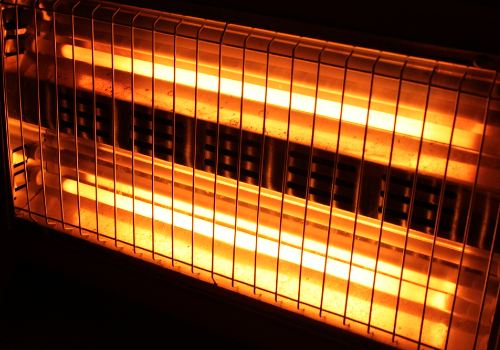
How do you heat a small camper?
The best way is with an electric space heater, which is how I warm my RV during cold weather.
I have a 24-foot Class C motorhome and RV full-time. I took the time to remove all of my propane appliances and tank as I found the entire system cumbersome and impractical to use.
Over the years, I’ve had several different electric space heaters.
All did a great job keeping my camper warm, from an $18 desktop heater/fan to a small $120 heater that looks like a fake fireplace.
There are also fake woodstove electric heaters (that cost under $100) if you want a more rustic element inside your camper.
My faux-fireplace heater is my current model for one reason; it doubles as a side table that I utilize every month of the year. I can roll it around and use it anywhere in my camper, so it serves a dual purpose and doesn’t need to be stored when the weather warms up.
For RVs my size or smaller, I can’t see any problem heating the interior with a compact electric space heater as long as you have a reliable source of shore power.
For larger campers, you can use a second electric heater to keep the interior evenly warm.
As a backup in the event of power outages or cold boondocking nights, I do own a portable tent heater that runs on the same one-pound propane cylinder I typically use for my camp grill, but luckily, I’ve never had cause to use it.
When buying that heater, I had to ask, “Can you run a propane heater in a camper?” as I was worried about it causing dangerous carbon monoxide levels.
Fortunately, there are many indoor-safe propane or butane space heaters for RV use.
What Features Are Important in a Space Heater for Camper
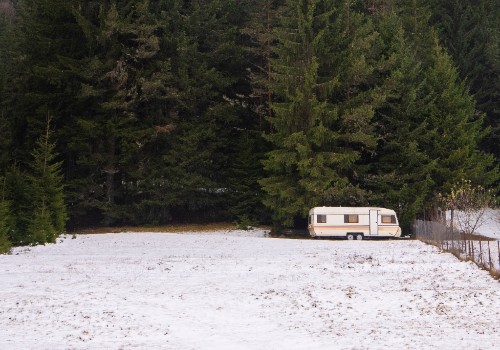
The best RV electric space heater will offer these features:
- Thermostat (with timer/remote control is even better)
- Automatic Shut-off Protection
- Compact Size
- Dual Function
You can find plenty of electric space heaters with all of these features and still find they are quite affordable.
Thermostat
Don’t bother with a space heater that doesn’t have a built-in thermostat. Otherwise, you’ll constantly be turning the unit off and on to control the temperature inside your camper.
For even more convenience, look for a model that comes with a programmable timer or remote control to run the heater. Being able to turn off the heater or lower the temperature without getting out of bed or off the couch is a nice perk!
Automatic Shut-off Protection
Make sure any space heater you select has safety devices such as automatic shut off for:
- Accidental tip overs
- Overheating
- Faulty electrical current
Most modern heaters offer all these functions, but read the label description carefully to be certain.
If you’re camping with small children or pets, only buy a floor model with a cage or other protection buffer to prevent burns if they touch the heater, or go with a tabletop version to keep it out of reach.
Compact Size
There’s no reason to take up space inside your camper with a heavy and bulky space heater.
Select a lightweight, compact floor or tabletop unit that provides enough watts to warm your space. You’ll find a wide range of sizes that offer the same wattage rating, so you can select the perfect size to fit your camper.
As a point of reference, a 1,500-watt space heater will warm around a 150-square-foot area.
Dual Function
Space is always at a premium inside a camper, so choosing an electric space heater with other functions is a bonus, especially if storage is tight.
Many space heaters can also work as a:
- Standard fan
- Table
- Air purifier
- Ambient lighting source
The best option for RVers who camp all year is to select a space heater and fan combination. Turn it to the heating side for RV warming, and switch to the cooling fan during summer.
Some dual heat-and-fan models also have a filter system to purify the air, like the Dyson Pure Hot+Cool.
While the Dyson is pricey, its sleek design, compact shape, and excellent filtering are worth the investment if you suffer from allergy issues.
Wood Stoves for RV Heating During Off-Grid Camping
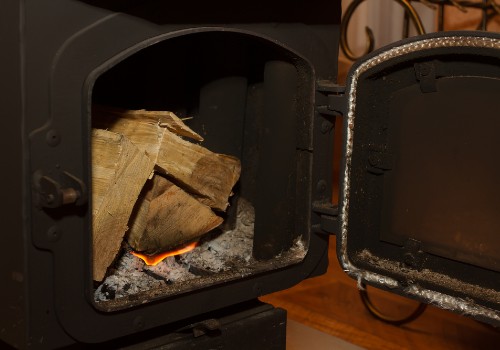
Many RVers are unaware that you can install a wood-burning stove to heat your camper without propane.
Wood stoves are the best alternative heating source for RVers who spend a majority of their time dry camping in cooler regions.
Wood stoves do need venting. Expect to install a pipe up your wall that exhausts through a hole to the outside of your camper.
Several wood stove models safely run with little clearance to walls and furniture, which means you don’t have to worry about the unit hogging up all your floor space.
For fuel, you can select units that run on:
- Wood or sticks
- Wood pellets
- Pressed logs
- Charcoal
Being able to heat your camper with wood can save you plenty of money, as there are plenty of sources of free sticks or logs you can collect.
What makes most wood stoves even more practical for RVing is the handy flat space above the stove that can double as a cooktop.
If you also want to have a heat source for cooking food, look for a wood stove model with a larger surface on top, so pots and pans fit securely.
Aside from the cooking option, check out these other crucial factors to determine which RV wood stove is best for your needs.
Size
A large wood stove is rarely necessary to heat a camper.
Big stoves will require more fuel to run and can quickly overheat a small recreational vehicle or campervan.
Want to Connect With a Community of Over 1,078 RV Enthusiasts?
Not sure you have space in your RV and wonder what is the smallest wood burning stove available?
The Newport Solid Fuel Heater by Dickson, is one to check out.
A 3,000 to 8,000 BTU output wood stove is sufficient for very small RVs, campers, vans, teardrops, or travel trailers.
For mid-size fifth-wheels, motorhomes, or camping trailers, a 6,000 to 14,000 BTU output wood stove is best.
Spacious motorcoaches, fifth-wheels, toy haulers, park models, or destination trailers should look for wood stoves that generate 40,000-60,000 BTU for ample heating.
Heating Efficiency and Exhaust Air Quality
Look for a wood stove with an EPA efficiency rating of 70% or higher.
If you can’t find an efficiency rating on a wood stove that interests you, it usually means it’s an older model that doesn’t perform well, so keep looking.
Do you worry about the impact burning fuel in a wood stove has on the environment?
There’s no need for concern as many RV wood stove models offer a very low three grams-per-hour (or less) of harmful exhaust.
Safety
An open flame inside your RV may freak you out, but wood stoves are very safe to operate with standard precautions.
Modern technology improves wood stove safety with easy-start ignition, door locks, heat control, and clean-burning features that reduce soot build up inside the flue.
A railing around the top of “cooking” wood stoves helps prevent pots of hot food or liquid from spilling, which is ideal if you have kids or pets or you’re just clumsy.
General Tips for Heating a Camper Without Propane
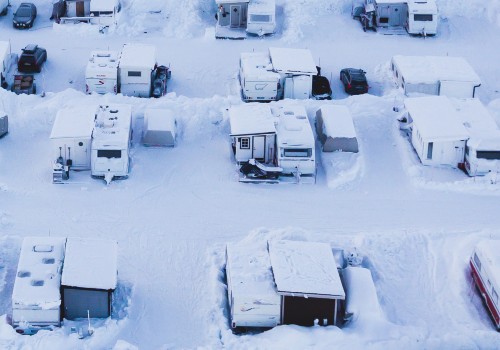
Any type of heating system you use inside your RV can pose dangers if you’re not careful.
The first safety tip is always to install carbon dioxide and smoke detectors in your camper and make sure you change the batteries every six months.
Electric space heaters are prone to overloads to the cord or plug, so check these areas daily to ensure they aren’t hot, charring, or melting, which all can lead to a fire.
If you spot any problems with overheating cords, plugs, or outlets, it’s time to get a new unit.
Another way to keep safe voltage running to your space heater is to use an RV power surge EMS protector, such as the TRC Surge Guard 35550, which controls flow and will shut down power when it detects faults.
The placement of any electric space heater or wood stove should never impede pathways to the exit door of your camper.
Cords on electric space heaters shouldn’t be in a place where they can become a trip hazard or pull the unit over.
Never use an extension cord to operate a space heater. Only plug directly into a 120-volt outlet.
You must maintain a regular cleaning schedule of any RV heating unit.
Wood stoves will need the oven cleaned out, and the flues scrubbed. There are many independent chimney sweeps who can service your stove that you can locate through the Chimney Safety Institute of America or the ICS Chimney Sweep Institute for those in Europe or the UK.
Electric space heaters will need dust accumulation cleared from air intake vents that could potentially catch fire. Unplug the unit and follow manufacturers cleaning directions to remove debris.
Final Thoughts
A camper without propane doesn’t have to mean you can only camp when it’s warm outside.
There are so many options for electric space heaters and wood stoves that can keep you toasty and safe while RVing and are a perfect backup when your propane heating system isn’t working.
If you’re looking for how to heat a camper without propane, check out wood stove or space heater alternatives. When you use the information above, you’ll know how to find the best unit to keep your RV warm so you can camp anywhere at any time!
RV Propane. What You Need To Know! (Video)
"Man cannot discover new oceans unless he has the courage to lose sight of the shore."
-- Andre Gide

